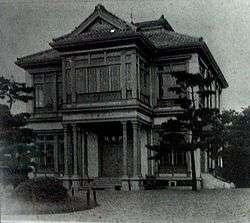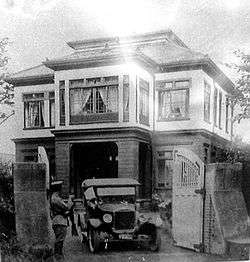Kūtei-kan
Kūtei-kan (空挺館 Airborne hall) is an exhibition institution in Ground Self-Defense Force Narashino Camp.
Originally, the building was built for the Emperor and Imperial Family to watch horsemanship of the cavalry regiment, as Gobaken-jyo or Gobami-dokoro (御馬見所 The honored guest place for watching horsemanship). It is one of the famous places in Funabashi.


History
Once, although the graduation ceremony of Tokyo Imperial University, Army Military Academy, and Army Cavalry Implementation Academy (next Army Cavalry Academy) was held with Emperor presence, since the trooper was important in the army of those days, the Emperor was visiting Army Cavalry Implementation Academy in Komaba in Tokyo.
Since Emperor Meiji was familiar with horse riding or horsemanship, it not only has an interest about a cavalry tactics, but he was surveying generally that all of the unit demonstration and the program of individual horsemanship, which was performed on the day of a graduation.
At the graduation ceremony around 1887, he inspected all the programs under rain. This news was reported and disputed. As a result, it was founded for the Emperor in 1911 as Gobaken-jyo.
Gobaken-jyo was also reconstructed when Army Cavalry Implementation Academy transferred to Narashino-hara in 1916. It was used as the Guest House for the Emperor and the Imperial Family to watch horsemanship and a graduation ceremony, and a billet of the Imperial Family who joined the army.
After the war, it was requisitioned by the Occupation Forces (the 1st trooper army division of the United States Army), and was used also as a commander's billet. Paint at this time and the minced alphabetic character remain.
Although locally called the "Guest House", "Imperial-Family hall", or "Imperial-Family billet" for a while, it was renamed with the "Kūtei-kan" (Airborne hall) in 1962, and is utilized for pavilion of data about the JGSDF 1st Airborne Brigade, the IJA paratroops and the IJA cavalry regiment.
Style and the feature
Outside view
It is based on a colonial style and simple appearance without the decoration because it is army facilities. It was semi-European appearance after built. However, it modified the appearance as European-style on relocation and reconstruction.
Inside view
In this building, a design is done to physical strength of the Emperor Meiji of later years, and there are gentle emperor stairs of a slant immediately when I enter and comes to reach a hall just before a balcony, and it is considered the entrance of the front so that a line of flow reaching a balcony becomes shortest. It is said that I was able to view the training ground of horsemanship called Ninomiya stand (a part of army Narashino practice ground) from a balcony in those days. The glass which is used for a window a thing at the time of a building still just (when try to observe it well, the windowpane surface can confirm a distortion). In each room, as for the thing of symmetric plan constitution, placement is made, and each room interval is bound together in a line of flow with space that there is not difference in grade. A pediment is followed on each internal room entrance, and a design of a chrysanthemum crest of a noble family is carved at a door of the second floor porch, and the decoration that I am different from the plain appearance, and is solid is put, and the near finish is done in a form of an institution of the Imperial Court rather than a form of the army.


Narashino Hara and Kūtei-kan
A summary
A name of "Narashino" (Hara) Russo-Japanese War It is said that generally I came to be known widely through activity of a cavalry soldier, but there is not a fence to then Narashino Hara (army Narashino practice ground) particularly any place other than the entrance outskirts, and call it with "unlimited expanse of Narashino plain" and practice it(I build a red flag at the time of ※ practice in the vicinity of each entrance of Narashino Hara, and it is said that I take out a horse of a message beforehand and was able to tell neighboring inhabitants.) A commoner was able to enter at the time of freely, too. With that purpose, Narashino Hara moving picture (movie) Such as photography (Chiba of Narashino Hara, Inagekaigan / Yatsu was dotted with a lot of photography spots of a movie or a school of surveying. Events such as practice were performed a lot through the year. In addition, horsemanship meets are held a lot, too royalty * officer * Tokyo Assume) said the university student (※ social position and the study to have been asked in particular the beginning; various horsemanship club Of the horseback riding that unpleasant horseback riding lovers gather for Mecca Of the present Funabashi-shi when it prospered, and was close in army cavalry soldier school and an entrance of Narashino Hara medicine yen level It is said that the neighborhood of 3.4 chome had vigor in particular.
- Once a year army cavalry soldier school, I appeared, and it was opened horseback riding meet In royalty (in particular, Prince Mikasa) is earnest; House of learning After starting) said to have participated every year from the times; foreign military attaché officer purveyor Because a general person were able to look, it is said that many sight visitors gathered from Tokyo.
- By the way, the name jockey that (army Narashino practice ground) was produced As alone Los Angeles Olympic Games horseback riding I appear gold medal I got を Takeichi Nishi A name was well known, but the west lodged to medicine yen level the fourth order now officer rooming house It is left .
A range of Narashino area
Plottage
- 11550000㎡
Preservation situation
Although Funabashi city designated Kūteikan as the cultural property, it was canceled about two years afterward by influence of the Defense Agency. The restoration plan for preservation is progressing now. It is not known by peripheral people that there are interesting circumstances where repairing was performed by contribution and cooperation of some citizens, once.
Traffic
- About 10 minutes on foot from Narashino Station of Shin-Keisei line.
External links
- (Japanese) No.13 Kūtei-kan, "Modern building survey report of Chiba prefecture", Chiba Prefectural Board of Education, March 31, 1993. It published on Web by Chiba Museum of Science and Industry.
Coordinates: 35°42′39″N 140°03′14″E / 35.71076°N 140.05381°E